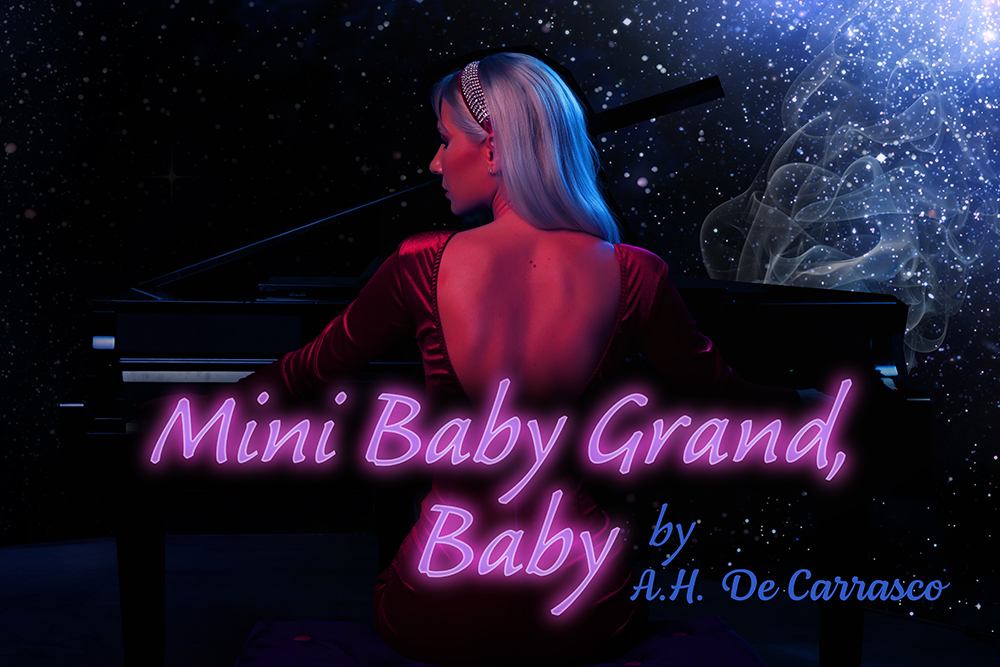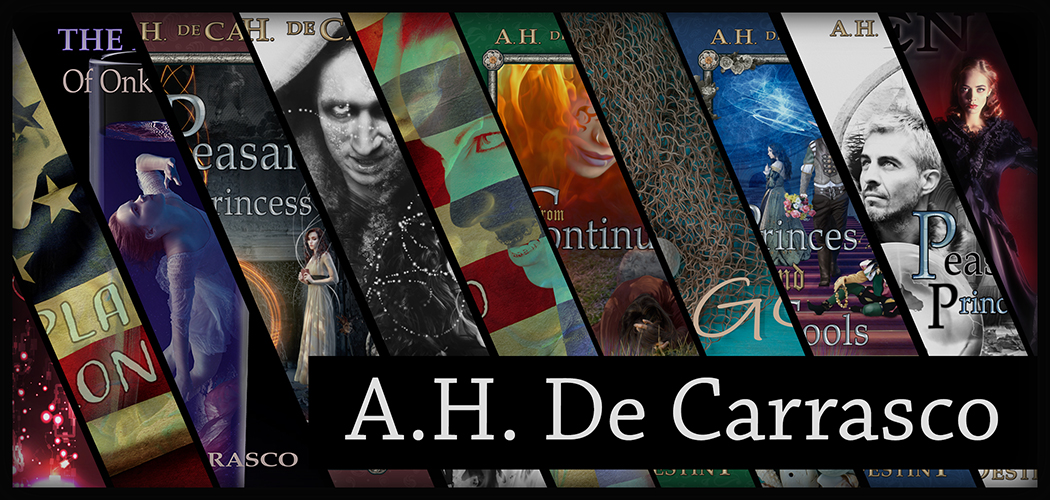
“She said it’s a mini baby grand, Elon. Didn’t you hear? A mini baby grand.”
“Yes, well, we had one larger—much larger—in our foyer at the mansion,” Elon answered, responding to his wife’s bristling by clearing his throat loudly, which sent his jowls bouncing beneath his jawline. “Of course, this specimen is fine, just fine, considering how limited you are with space.”
“Exactly,” my husband agreed as he handed Elon and his wife, Sheri, their old-fashioneds, a twist of lemon drooping from the edge of each glass. “Look at that view. It never gets old.”
Beyond the large bay windows to the right, the stars glittered against black velvet. To the left, the translucent blue and gold blooms of a nebula invited a deeper reflection.
I spread my arms and took large steps to indicate the different sizes of pianos. “A mini baby grand, a baby grand, a grand—which is my guess what you had, Sheri—to a concert grand.”
“Charming, my dear.” Sheri’s smile was brittle.
Equally, I felt my confidence crack, and I laughed self-consciously, hoping they wouldn’t note the anxious edge choking my giggle into raspy air. I shrugged, trailing a path with my finger along the onyx curve of the squat tuxedo-pleaser. “Gosh, I miss the sound of a real grand in a concert hall.”
No one said a word. The room fell into what I feared was silent apathy, the conversation dead on arrival. My worry deepened, and I winced inwardly, knowing our future would depend on entertainment. As my awkward nature fought to resurface, I longed not just for the safety of a friendly audience looking on me, but for the large curve of the concert grand, that space where I could lean, that groove like a safe spot. My husband, Mark, didn’t really like me talking about those times—my successful years before I met him.
A ripple of life returned to the group as Mark slowly lifted his drink to his lips. His eyes glared a warning. But the awkwardness of the moment stretched as Elon looked at his watch and Sheri brushed her hand through her honey-blonde hair.
“Explain concert hall, please,” Sheri asked, finally.
I set down my glass on the black lacquer—something I would never do on Earth. I moistened my lips. “It was a place where people gathered—”
“A gathering of people,” Sheri said with a slight lilt at the end of the last word. People. My thoughts flew to Earth and the countless times I watched Funny Girl with my mother, and we dreamed of my moment in the spotlight, until my father got home—angry from his late shift and a quick hour at the tavern.
I bit my lip. It would do no good to show my emotion or convey how much I cherished those times with my mother.
“Ah, I can see that your eyes are leaking again, my dear,” Mark noted. His own eyes had changed.
Again.
I almost wished for my Mark’s hostility. But he wasn’t behind those eyes any longer. It was so rare for him to get out, and I’d ruined the moment for him. The being behind his face was no longer my easily angered husband but an observer of form.
The Mark before me feigned concern, grasping the roundness of my shoulder in comfort, though his lips stretching into an inappropriate grin. “We mustn’t talk about this ‘concert hall’ now.”
“Tears,” I corrected. “They are called tears, Mark.”
“Yes, tears,” Sheri said, her eyes rolling back into her head and then returning to view me. “Tears.”
“And I don’t mind explaining what a concert hall is,” I added.
“Good!” Elon glanced for the tenth time at his watch. An ineffective habit where we were—wherever we were—but productive in other ways, I supposed. “Do continue then…”
“A concert hall is a spacious room with special sound acoustics. A place where people gather to listen to other people perform music, through instruments like this piano or by singing with their vocal cords.”
“Yes, like the music you played last Wednesday. That was Wednesday, wasn’t it?” Sheri turned to Mark while I stifled the urge to say what Wednesday?
I stopped explaining. I didn’t tell them the rest, that a concert hall was like a perfect living room to me—a place where people saw me, waited for me, and I was safe with them. That attention kept me far from harm. For those precious hours, my father couldn’t snarl at me or turn up the TV, which he would always do. He was stuck there. He was trapped in that uncomfortable, dark seat beside my proud mother. And I… I would stand there, in that space, and sing.
Impulsively, I began to sing a love song from that famous musical about angry carnival workers. But then I shook my head, frustrated at the lack of accompaniment. I sat at the mini baby grand and I played. When Mark opened his mouth to say, “that’s enough,” I played louder. I sang the entire ballad about love while glaring at him.
In the meantime, he tried to mimic my expression and failed miserably, his face contorting, his eyebrows furrowing then wiggling. I could see the wheels turning behind his eyes—unable to solve some riddle about human emotions—as he grasped for understanding. He looked so comical, I didn’t know whether to laugh or to weep.
I got through three of my favorite songs before Mark placed his hand on the top of the piano and the sound stopped.
“Summarize,” Sheri said.
I took a deep breath and let it go. “I can’t.”
“Summarize,” Elon, and then Mark, echoed.
A metallic hiss entered the sound speakers located on the ceiling above my stylish prison.
“Summarize,” a whisper of a voice eased in over the crackle of static.
I stood up and closed the piano cover. My mind blanked. I had no more words for them. I turned to look out the windows. I stared at the blooming blue, gold, red, and purple of the nebula. I walked up to the glass and pressed my hands against the cold surface. In the reflection, I saw my face, the hollows of my cheeks, my unblemished skin, my wide brown eyes, and the perfect whiteness encircling my irises. But I had not looked so in a very long time, truly.
“Speak, darling,” Mark coaxed, his voice a contradictory mixture of the mellow and the mechanical.
“What more can I say? I’m on my own, pretending you’re beside me.”
My hand, splayed against the glass, bunched into a fist. I hummed softly. “You’d be, oh so easy to love…” If you were more convincing, but you’re not good at this role. In fact, you suck at it.
I searched into the blackness beyond the glass for my Mark. Let me lead you from your solitude.
“Is there anybody out there?” I whispered low as those lines from The Wall threaded through my unravelling mind. I pressed my forehead to the glass and forced myself to look out, like I had during my most troubled moments.
Beyond the nebula painted on a theater scrim, I saw my audience of dark shapes, tall and slithering, of thorny shoulders and twisted necks, with teeth twice the length of my hand and white eyes bobbing and sagging upon stalks sprung from hollowed sockets. On the left, reclined my husband, almost equally strange with yellow skin stretched taut, his body hollowed in places and his faded uniform hanging in tatters and ripped free where his body was attached to thick tubes. Beside him sat my captain, Elon, and his wife, in a similar state of dying. I refused to look upon the withered corpse to the right of them—the one that was me.
I turned back to Mark, entertaining guests in our home, somewhere in space.
“Could we start again, please?” I sing to him, my voice a raspy whisper.
I let my eyes leak.
*****
Copyright 2019 A. H. De Carrasco. All rights reserved. Stock images used are from Depositphotos, Inc., blanaru, clearviewstock, and Dr.PAS
Thank you to Hot Tree editing for looking over this piece.
I was a singer in another life, when I was young… er. I sometimes wonder where I felt safer, in everyday life or on stage, and the answer to that question changes depending on what memory I fixate on.
Music supplies the soundtracks of our lives. Songs mentioned are all awesome and worth a listen. “People,” Funny Girl; “On My Own,” Les Miserable; “All I Ask of You,” The Phantom of The Opera; “Easy to Love,” Anything Goes; “Is There Anybody Out There,” The Wall; “Could We Start Again, Please,” Jesus Christ Superstar.




